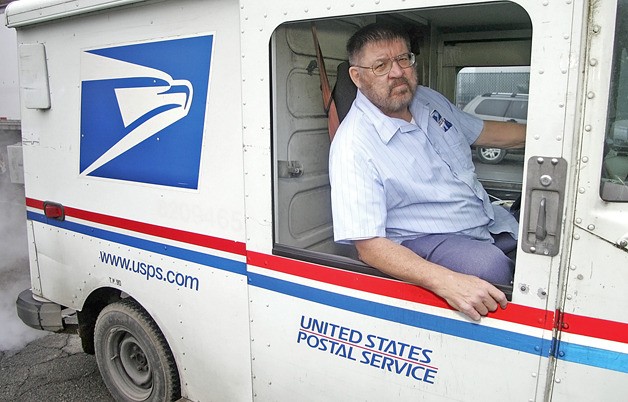Ask Gene Shilling how much a stamp cost in 1968, the year he started with the United States Postal Service, and it takes all of a millisecond to get a response.
“Six cents,” he said.
An additional 38 cents, 42 years and a handful of different postal delivery vehicles later, Shilling’s days as a postal carrier are over.
Shilling, 67, retired from the Auburn Post Office on Dec. 2 after more than four decades in uniform. He spent 30 of those years delivering mail on the same route on Auburn’s West Hill across from Jefferson High School.
“When I started, we delivered to all of Federal Way,” Shilling recalled. “The Auburn Post Office delivered all the way to Redondo Beach.”
Now the same area, which includes Edgewood, where Shilling grew up, is covered by at least six post offices.
In 1968, Shilling said the Auburn Post Office had about 20 different delivery routes.
Now, it’s closer to 50 routes and more than a dozen rural routes, Shilling said.
And that’s not all the changes Shilling, who graduated from Sumner High School, has seen.
When he first started delivering mail at age 24, after working at Boeing, Shilling said delivering the mail was a much more arduous affair.
“The volume has gotten less and less through the year,” he said. “When I started it was a different kind of mail. When I started it was letters and cards and a lot less advertising. Now it’s more advertising. The only first-class mail I get are bills and, of course, Christmas cards. But I’d say most of the mail nowadays is mostly advertising.”
Additionally, back in the days before the United Parcel Service and Federal Express, Gene said, postal workers found themselves doing a lot more heavy lifting.
“We used to have all the parcels. And they were a lot heavier.”
Automation also has affected the way Shilling’s job is done.
When he first started, each route had a book, where forward addresses for people who had moved were kept. Customers filled out a form that they either left in their mailbox or personally handed to their postman.
“I used to know when people moved,” Shilling said. “Now, they just go online and do it, so I don’t know where they are.
“It’s not as personal,” he added. “I know a few of the older people, but a lot of the new people I don’t know. They move in and out faster. I have a few people who have lived there a long time, but it seems like most move in and are gone in a couple of years.”
The mechanics of delivering the mail over the years have gone through changes as well, Shilling said.
“When I first started, the first mail truck was like an old-time Chevrolet milk truck,” he said. “You could stand up and drive it. It had a little skinny door in back. Then they went to Jeeps, Broncos and Studebakers. And for the last 20-something years, we’ve been driving the LLV’s.”
That’s the Grumman Long Life Vehicle, which the Postal Service has been using since 1987. The LLV features a right-hand driving position to put the postal worker on the curb side of the vehicle.
Shilling said he misses the old Studebaker Zip Van.
“I liked the Studebakers,” he said. “The new ones are terrible. There is no vision in the back. It has no windows in the back. You can’t see. And the mirrors create a blind spot on the side. You can’t see people walking.
“The old Studebaker was the best they’ve had. It had a lot of windows.”
Shilling might not miss his mail truck now that he’s retired, but there is one thing he said he’s going to miss about working at the Auburn Post Office.
“I’m going to miss the people, I’m not going to miss the job,” Shilling said. “There have been a lot of good people.”
Now, Shilling said he’s going to relax, work in his yard and enjoy life with his wife of 38 years, Mira – whom he met at the Post Office – and his two daughters, three grandsons and two great-granddaughters.
“I don’t have any plans,” he said, “I’m just going to see what comes.”



